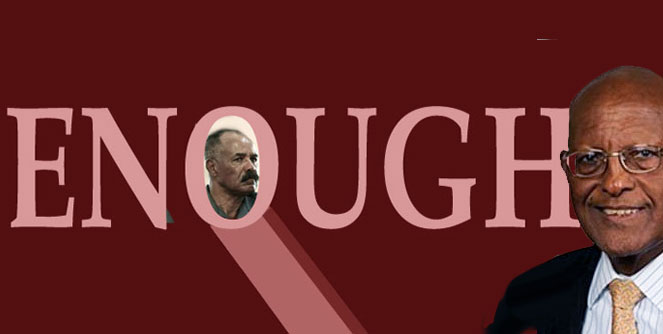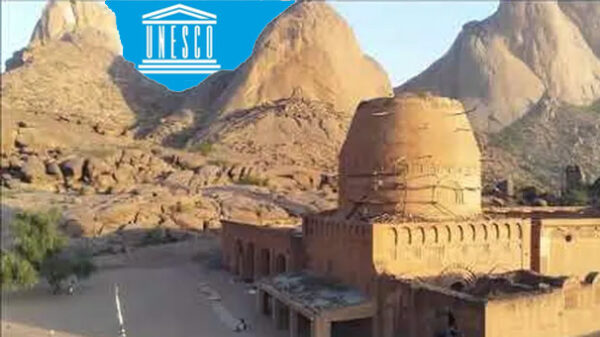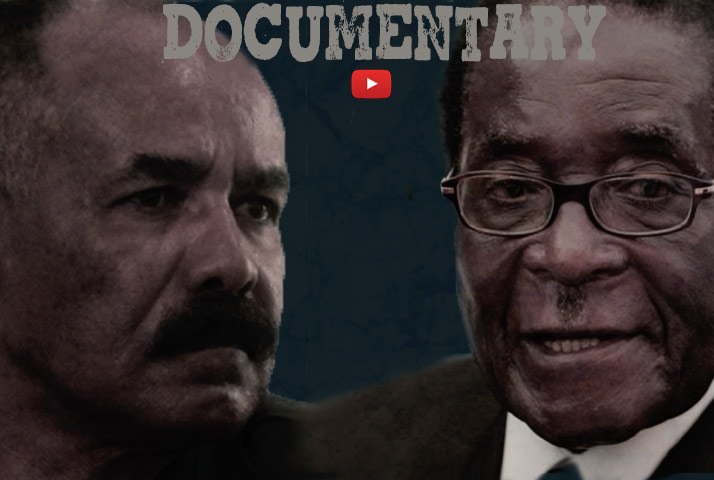Enough Is Enough: What Is Next?

Amanuel Kifle (Doha), the young man from the Washington DC area, has ignited Eritreans everywhere by his powerful, “Yiaakle” (Enough) message that is spreading like wildfire. Even those silent Eritreans who have given up on Eritrea and many of those who have been supporting the regime are now awakened.
Much as it is heartwarming to see Eritreans everywhere saying enough is enough that by itself will not bring an end to the suffering of our people. We need to think about what we, the Deleyti FitHi (justice-seeking) Eritreans in the Diaspora, that now includes the ever-expanding base of Yiaakle movement, can do to move the “Enough is Enough” movement to a higher level. The purpose of my writing is to suggest some ideas about what Eritreans in the Diaspora can do to end the suffering of the Eritrean people and to transition our country to a democratic rule.
I submit the first thing we should all agree on is the prospect of positive democratic changes in Eritrea is unthinkable as long as Isaias is in power. The regime has to be removed immediately if democratic changes are to take place in Eritrea. And obviously, it is the military forces inside the country who have the potential to remove the regime with the collaboration of the Eritrean people inside the country. Our role, the Deleyti FitHi in the Diaspora, is to play a catalytic role in facilitating regime change in several important ways as noted below.
Winning the Hearts and Minds of the Security Forces
The main reason why the Eritrean people inside the country have helplessly suffered under a dictatorial regime for the past 28 years is the fear of the regime’s brutal security forces. Hence, our first target should be to win the hearts and minds of the well-financed and well-equipped security forces that are protecting the regime. The security forces should be reminded that their loyalty should be to their country and not to a dictator who has destroyed our country. Isaias has forced our most precious resources — the youth — to flee and is now threatening our sovereignty that has been won through the sacrifice of thousands of our heroic liberation fighters and patriots. To this end, we need to send strong and disarming messages, using penetrating songs and heart touching poems that are targeted to the security forces through satellite TV programs, shortwave radios, through clandestine literature and other means of communication. This is already being done to some extent but we need to raise the level and the degree of sophistication through well-coordinated and professionally crafted methods. Our messages should aim at humanizing the security forces so that they will refrain from aiming their deadly weapons at their Eritrean brothers and sisters.
Emboldening the Civilian Population Inside the country
The next target should be the civilian population who have suffered helplessly for the past 28 years and who has now reached the limit of its patience by Isaias’s reckless moves that are threatening the very sovereignty of our country. The civilian population has been silenced by the immense and overbearing power of the security forces who are merciless in suppressing any public uprising. But if the security apparatus of the regime could be persuaded not to aim its deadly weapons against innocent civilians, it is possible that the civilian population who has learned important lessons from the recent events in Sudan might be emboldened to challenge the system by staging peaceful demonstrations. Eritreans in the Diaspora should send powerful messages aimed at the civilian population that will embolden them to confront the regime.
The role of the military
The third group that should be targeted are the military forces who have already shown their dissatisfaction with the dictator. Regime change will only come when the military forces take bold action to remove the regime through a surgical military operation with minimum collateral damage. Eritreans in the Diaspora should not only send encouraging and emboldening messages but should also provide material support to those who will take the necessary measures to remove the regime.
The military forces should be reminded that they should not let one-person gamble with the sovereignty of our country and undo what has been achieved by our gallant fighters with the support of the Eritrean people inside and outside the country. Eritrean writers, poets, musicians, and artists should keep on reminding our military forces that they should not let one person destroy our country.
The role of Eritreans in the Diaspora in the aftermath of regime change.
Eritreans in the Diaspora can play an important role in dealing with the challenges the country will face after the removal of the regime.
Formation of Professional Associations
One important role Eritreans in the Diaspora can play is by forming professional organizations that will coordinate the activities of the members of their respective professional associations. Eritrea is blessed to have so many well educated and high caliber, economists, engineers, lawyers, scientists, educators, journalists, money and banking professionals, accountants, public health professionals, tourism and hospitality professionals and experts in foreign policy matters, investment, marketing, information technologies (IT), etc. These professionals should take the initiative to organize professional associations of their respective areas of expertise with a view of preparing policy-oriented white papers that can help the country in the aftermath of regime change. I believe preparation for such white papers should start without any delay, anticipating regime change any time soon.
The Need for Legitimate Global Representatives
It is heartwarming to see Eritreans in the Diaspora getting organized and transmitting their “Enough is Enough” messages from every part of the world. It is also encouraging to see several civil society organizations mushrooming, such as the youth, the Eritrean women, Eritrean lawyers, Eritrean intellectuals, Eritrean artists and musicians, Eritrean minority ethnic groups, and those that have formed regional or religious associations, Human Rights Activists, etc. These groups are doing excellent work. However, there is also a need for all these groups including Eritrean Delyti Fithi (Justice-seekers) who may not be part of these organizations to unite in order to be effective in bringing about meaning positive changes in our country. What we are missing is a body that can effectively coordinate the activities of the various fragmented groups, a body that has the legitimacy and the mandate to speak for all of us in the Diaspora with one voice. This is particularly necessary for undertaking lobbying, advocacy, and diplomatic work. We have to admit that the fragmented approach is not going to be as effective. We need a body that can legitimately represent us at the United Nations (UN), the African Union (AU), the European Union (EU), the Arab World, the IGAD, and in other settings.
The Global Representatives can coordinate our media activities to appeal to the security forces and to embolden the military and the civilian population. In addition, they can help in preparing the groundwork for a smooth transition and in gaining support for the demand of the Eritrean people to remove the oppressive regime that has literally destroyed the fabric of the Eritrean people.
The Process of forming legitimate Global Representatives
For the Global Representatives to be legitimate with the mandate to represent the Eritreans in the Diaspora, it is critically important that all Eritreans in every part of the globe, particularly the members of the various activist groups participate in the election process. What has rendered Diaspora Eritreans ineffective, so far, has been their fragmentation. Ideally, the process of electing legitimate Global Representatives should start at the grassroots level, where members of all the various constituent groups and political parties have an opportunity to participate in the election process as members of their respective communities regardless of their party or group affiliation. I am not advocating the disbanding of these constituent groups. What I am urging is the full and active participation of all the various fragmented activist groups, particularly members of the various political organizations, to participate in the election process along with their Eritrean brothers and sisters in their respective geographical areas. This will require an intensive campaign to mobilize and reach out to ALL Eritreans in every locality irrespective of their gender, religion, ethnicity, region and political affiliation.
Once Eritreans in every corner of the world elect their local leaders, the next step for these elected leaders is to meet and elect their country-wide representatives. This process should take place in every country and every continent.
The final step is to have a global conference of Eritrean representatives from every corner of the world: Africa, Asia, Australia, Europe, Middle-East, North America, South America and other places to elect the Eritrean Global Representatives.
Preparing the groundwork for a smooth transition.
Due to the well-financed security apparatus of the regime, those who will remove the regime from inside will have to operate under extreme secrecy. This means they will not have the luxury to prepare detailed plans for a smooth transition in the aftermath of regime change. The Global Representatives with assistance from Eritrean elders, technocrats, intellectuals, seasoned politicians, diplomats, and other advisors can help in preparing a blueprint to ensure a smooth transition. Among these tasks that require advance preparation are:
- Maintenance of peace and order. We all know what happened in Somalia after the fall of Said Bare, or what happened in Libya after the fall of Gadhafi. Hence, to avoid a repeat of Somalia or Libyan experiences, it will be imperative to make the necessary advance planning and preparation to ensure a smooth transition to democracy. The elected Global Representatives can help the forces inside the country by helping plan in advance for the maintenance of peace and order in the aftermath of regime change.
- Planning for a smooth transition. The Global Representatives will be expected to assist the forces inside the country in the following important tasks, among others, in order to ensure a smooth transition:
- Planning for an all-inclusive National Conference within the shortest possible time frame.
- Establishing procedures for the election of a Constituent Assembly.
- Mobilizing knowledgeable and experienced technocrats who can assist the caretaker transitional government in jumpstarting the various sectors of the economy, in the management of the banking sector and the various government entities that provide vital services such as addressing public health, food security of the population, etc.
- Advocacy, lobbying, and diplomacy. The third important activity that can be done by the Global Representatives representing Eritreans in the Diaspora is in the lobbying, advocacy, and diplomatic arena. Although Eritreans in the Diaspora have shown their commitment to helping their people by conducting demonstrations, writing petitions, appearing in congressional hearings, at UN meetings in Geneva and in New York and writing letters to the Prime Minister of Ethiopia, etc. In spite of our best efforts, unfortunately, the outcome so far has not been very effective. These measures were taken by dedicated activists or groups, which are commendable; however, they could have had a greater chance of being heard more seriously if they were coordinated and conducted by a leadership that has the legitimacy and the mandate to speak and represent all Eritreans in the Diaspora.
An important advocacy, lobbying and diplomatic work that can be done by the Global Representatives or an appointed group of high-caliber experienced Eritreans is to convince the International Community in general and the UN, AU, EU, the Arab League, and IGAD, in particular, to support the Eritrean people’s demand for social and political change. These organizations and the International Community as a whole must understand that Isaias is not a constitutionally and democratically elected leader. He has ruled the country with an iron fist for over 28 years, without any constitutional mandate. He has committed serious human rights violations against his people that are properly documented by the United Nations Human Rights Enquiry Commission that amounts to crimes against humanity. The world should understand that the Eritrean people have no other option but to remove this ruthless dictator by all means available to them. He has taken power illegally, hence, he is a usurper, and as such he has no moral or legal ground to defend his dictatorship. We have to convince the international community Isaias is an illegitimate “leader” and a violator of all human rights and related principles that are honored by the family of nations.
Once elected, the Global Representatives with the mandate given to them should negotiate with the foreign powers to get much-needed assistance to jumpstart the ruined economy of the country.
The elected Global Representatives will be expected to have a serious discussion with the leaders of the Ethiopian government. They should stress that democratic Eritrea after Isaias will certainly want to live in peace and harmony with Ethiopia, in a context of two neighborly sovereign countries operating for peace and development of their respective economies and societies. The agreements that will be made between these two countries will have to be based on these principles. Any agreement made with Isaias cannot be endorsed by the democratic government of Eritrea if it contradicts the above-stated principles.
Summary and Conclusion
To summarize and conclude, the time is ripe to remove the dictatorial regime before our hard-won sovereignty is compromised. The regime has to go by any means possible. And it is the forces of change inside the country who are in a better position to remove the regime. But Eritreans in the Diaspora can and should also play an important role in the process of regime change and in helping the forces inside the country to formulate a blueprint to ensure that there is a smooth transition to democracy in the aftermath of regime change. This requires all justice-seeking Eritreans in the Diaspora to work together by forming professional organizations who will prepare essential policy-oriented white papers and by forming a legitimate Global Representatives that is given the mandate to represent them and that will coordinate their activities. For the legitimacy of the Global Representatives, it is important that they are elected through the participation of all justice-seeking Eritreans in every part of the world, starting at the grassroots level, followed by forming country-wide representatives and ultimately electing legitimate global representatives.
In this effort, Eritrean website masters, PalTalk Room administrators, radio and TV managers can play a vital role, as they have been doing all along. We should all be grateful for their tireless effort.
In conclusion, I would like to express my sincere appreciation to all the Eritreans in various parts of the world who are enthusiastically getting organized under the banner of Yiaakel. And to all those who are tirelessly trying their best to mobilize Eritreans, such as Hizbawi Meleal in North America; Eritrean Community for Justice, Washington Metropolitan, Hadnet Eritrawian NeftHi, UK. Germany, Sweden, Holland, Canada. Australia, and other countries; the Association of Civic Organizations, the Global Initiative to Empower Eritrean Grassroots Movement (GI), the Geneva Task Force to elect global representatives, the group of intellectuals who have prepared the Denver Manifesto, the Renaissance group, members of One Nation, Bright Future, and individuals who are sending powerful and moving UTube programs such as Fanus, Mestiyatna, Memher Temesghen Kahsai, and others.
NB: Any accounting professional who is interested to spearhead the formation of a global association of Eritrean accountants, please contact me. I will be happy to give you some insights on how to proceed.
I will be very grateful to anyone who will volunteer to translate this article into Tigrigna or Arabic, on a pro-bono basis or for a modest fee.
Araya Debessay, PhD, is Professor, in the Department of Accounting and Management Information Systems, at the University of Delaware. USA. This paper is a modified version of the paper, titled the “The Role of Eritreans in the Diaspora in Building Democracy in Eritrea” he presented at the conference on the Building Democracy in Eritrea, that was held at the Senate House, University of London, on April 24-25, 2019. He can be reached at debessay@udel.edu.



Awate Forum